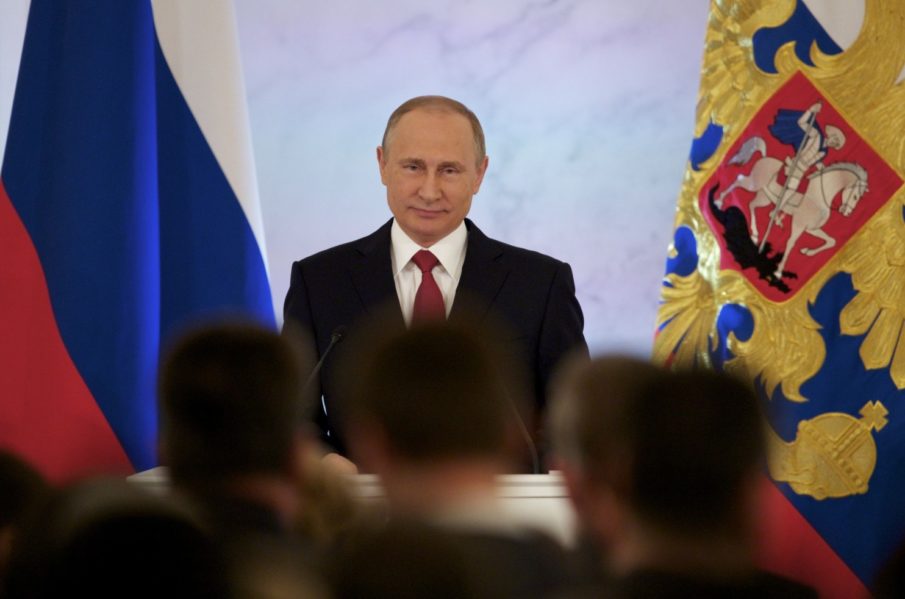Russia’s president, Vladimir Putin, delivered his annual state of the nation address on Thursday, in which he called for international cooperation, but emphasized that the nation would “not tolerate that our interests are either neglected or infringed.”
Tensions have been high between the Russian Federation and Western powers in recent months, due in large part to military operations in Syria. Russia’s relationship with the United States has been particularly strained, with the US backing out of bilateral talks with Putin’s government regarding the ongoing Syrian war and Russia announcing that they would no longer honor a decades old nuclear agreement made between the two nations that called for the destruction of stockpiles of plutonium that may be used in the development of nuclear warheads. The announcement was made on the heels of another nuclear revelation out of Moscow: the unveiling of the Kremlin’s newest line of Intercontinental Ballistic Missiles, the Satan II, touted as being able to destroy a land mass the size of “Texas or France” with a single nuke.
Many hope that President Elect Donald Trump’s stance regarding increased cooperation with the Russian state will lead to a reduction in military posturing before tensions lead to a second cold war. Still others argue that the second cold war may have already begun. Putin tried to assuage those fears by stating that Russia is not seeking increased hostilities with other nations.
“Unlike some foreign colleagues who see Russia as the enemy, we do not seek – and never sought – enemies. We need friends,” he said in his address.
Putin made a number of thinly veiled criticisms toward Western leaders and the media during the speech, while praising the courage of the Russian military personnel currently fighting rebel groups in Syria in support of Syrian President Bashar al-Assad; a gesture which drew significant applause from the Kremlin crowd. He concluded his statements regarding Syria with a light jab at the United States under the guise of calling for international cooperation between Russia and Donald Trump’s political regime.
“We are ready for cooperation with the new administration,” Putin said. “I am counting on joint efforts with the United States in the fight against real, not imagined, threats of international terrorism.”
Leaders from both the United States and the European Union have criticized Russia’s Syrian bombing campaign in recent months, citing their support of the Syrian president as the primary objective of the campaign rather than actively engaging ISIS forces in the region. President Bashar al-Assad has been accused of numerous human rights violations by Western leaders.
Putin did address criticisms from the EU as well, seeming optimistic about increased relations between European nations and Russia in the future, “I’m convinced that this conversation is possible with states of the European Union, where there is growing demand for an independent, subjective, political and economic course. And we see that in the results of elections.”
Putin also addressed Russia’s Olympic doping scandal, wherein some Russian athletes were banned from competition in Rio earlier this year after a state-sponsored doping ring was uncovered by a World Anti-Doping Agency inquiry. Putin called the situation a “blessing in disguise” and announced a broad anti-doping system that will go into place next year.
Putin’s speech went on to address social and economic issues facing the Russian nation. “The fight against corruption is not for show,” he said regarding recent political scandals such as Russia’s Economy Minister, Alexei Ulyukayev, pleading not guilty to accepting a $2 million bribe to endorse a state takeover of Russia’s oil industry.
The speech was not well received by all in Russia. Prime Minister under Putin, Dmitry Medvedev, seemed to fall asleep during the speech and some political analysts accused Putin of merely going through the motions for the sake of the spectacle.
Already have an account? Sign In
Two ways to continue to read this article.
Subscribe
$1.99
every 4 weeks
- Unlimited access to all articles
- Support independent journalism
- Ad-free reading experience
Subscribe Now
Recurring Monthly. Cancel Anytime.
“The only emotional parts of the speech concerned international politics, everything else was dreary, full of banalities,” said Stanislav Belkovsky, a liberal Russian political TV pundit. “It’s clear that Putin’s address to the Federal Assembly is nothing more than a ritual at this point, he doesn’t treat the content of his speech seriously.”
Putin concluded his speech by calling for tax reform, investments in healthcare and education and improvements in private sector Russian technology.
“Let us remember that we are a united people, we are one people, we have one Russia,” he said.
Image courtesy of the Associated Press










COMMENTS